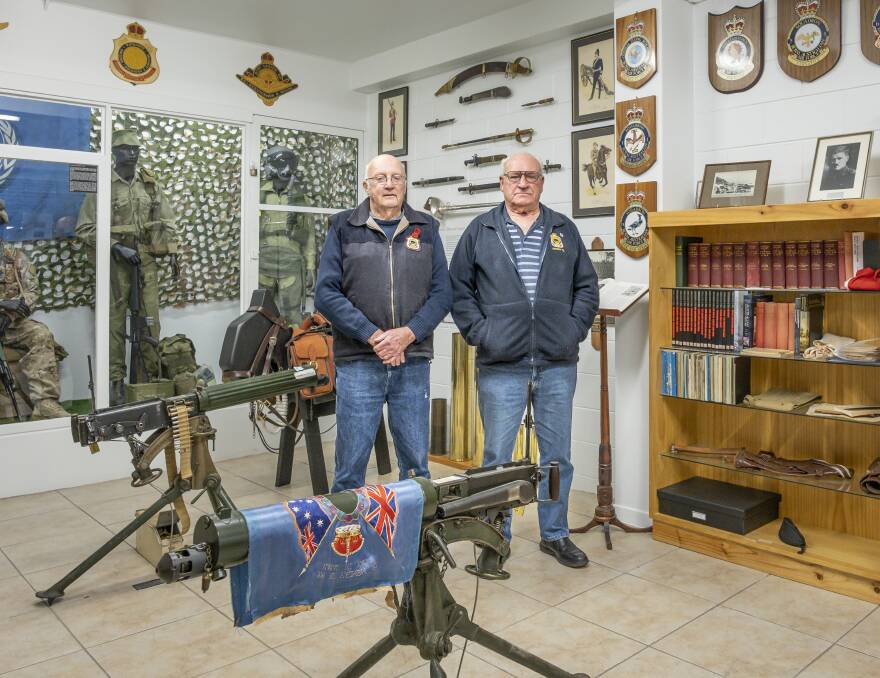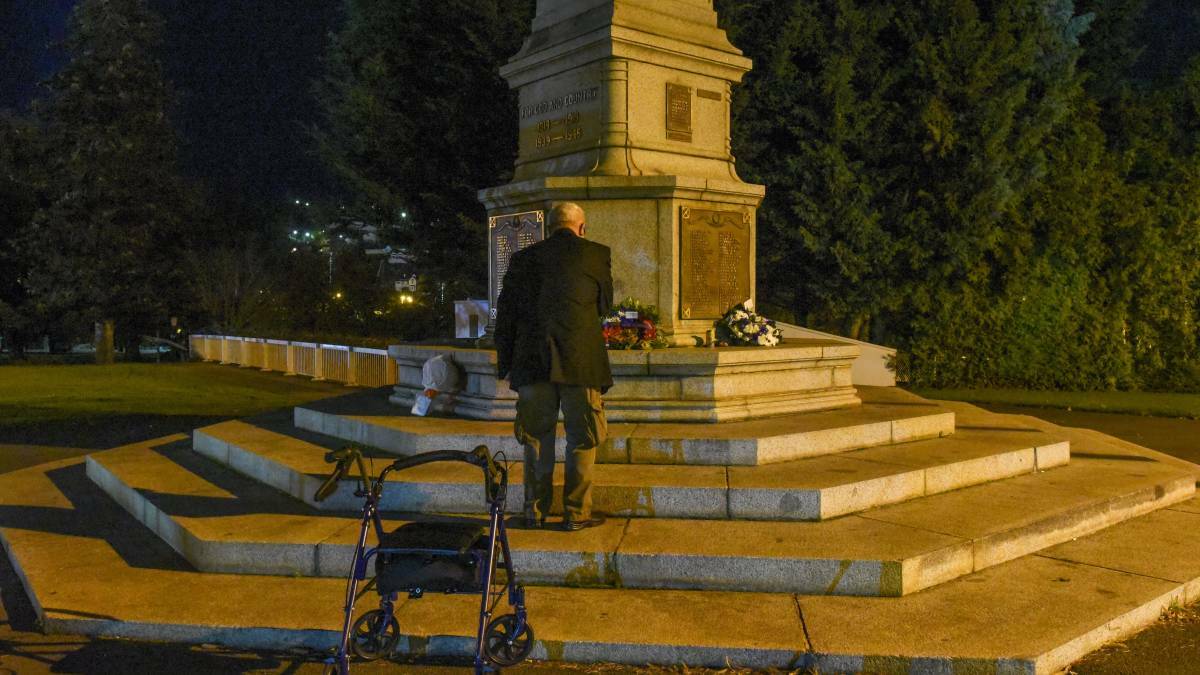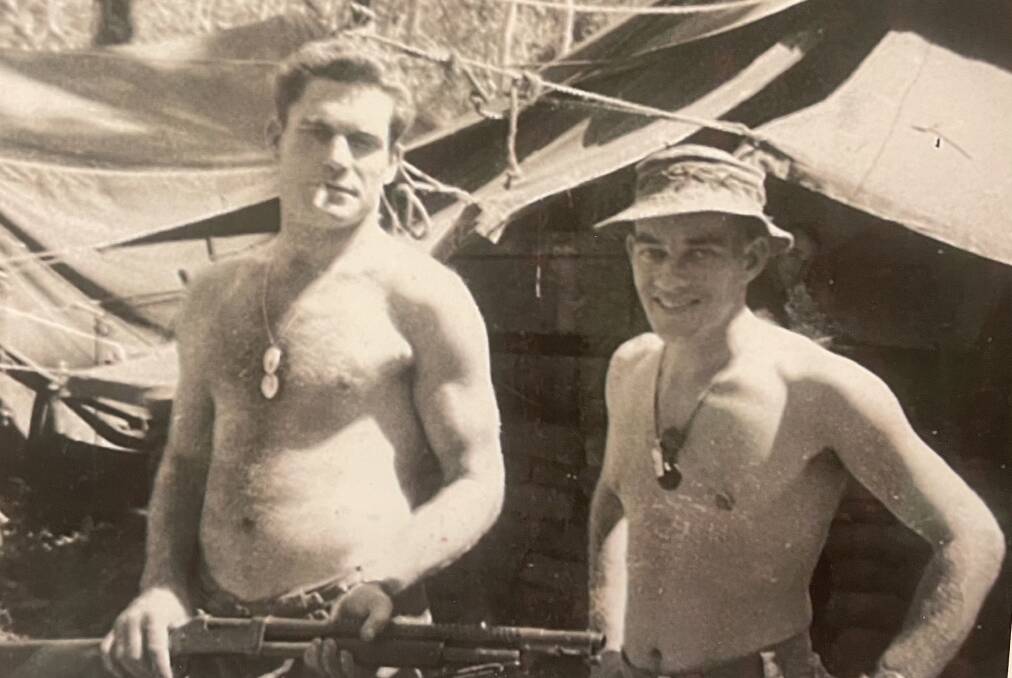
Sauntering through the doors of Launceston RSL is like walking into a different kind of world.
Subscribe now for unlimited access.
$0/
(min cost $0)
or signup to continue reading
The beer is the same, though some might say it's a little tastier, the low thrum of electricity and background music is the same, and the fluorescent lights that give the room an almost sterile glow are the same.
But the vibe of the place is different.
IN OTHER NEWS:
Sitting at the bar are an assortment of ex service men and women. Several conflicts are represented.
Nowadays, WWII veterans are all but gone and Vietnam Veterans are the old firm.
The fearsome folk reflect
Seventy-eight-year-old Sergeant David Noles sits at the bar of the RSL regularly.
In his heyday he was a burly and brave infantryman, then later a crewman in the RAAF.
He was 26 when he flew to Vietnam for God and country.
An enlisted serviceman, Mr Noles was never subjected to the nerves and anxiety of waiting to hear if he was going to be conscripted. He knew what was coming, and he knew it better than many having served in Malaya and Borneo.

Even though he had experience in the service, and he headed into the Vietnam conflict in the RAAF rather than the Army, he said Vietnam was a whole different kettle of fish.
He said flying over the trees of the Vietnamese jungle was an awry experience. Gun fire could come from anyone, and anywhere, and because of the density of the trees, it would be upon him faster than he could say "G'Day".
"When you take off and you're flying over Vietnam, anyone on the ground can shoot at you, and you can't see them," he said.
When you're up in the air in a gunship, everyone looks the same. You don't think of who you're shooting at when they're shooting you. You haven't got time to think about it. You start thinking about it, and you're going to get shot.
- Sergeant David Noles
His role as a crewman meant he did not have to "carry packs through the jungle", but his tasks were far from easy.
"Our role was resupply, picking up the wounded and the dead, transporting troops into combat areas, supporting fire with gunships when they were in the s***, evacuation, dust off and all sorts of things," he said.
The hardest thing is when you're picking up someone who's wounded and he's calling you 'mum', that becomes pretty hard.
- Sergeant David Noles
Mr Noles remembers he ended up doing 900 hours of flying in 11 months - and the longest day flying was nine hours straight.
"And that's especially long when you've had nothing to eat," he remembered.
"And 500 out of those 900 hours were on gunships."
He said time on gunships was the most difficult of all.
For his efforts in Vietnam, Mr Noles was awarded a distinguished flying medal, something only awarded in extremely rare circumstances.
Despite the rarity of the medal being awarded, you won't find What Mr Noles did to deserve it. And Mr Noles himself, not being one to talk up his accomplishments, is unlikely to go on a rant about exactly why it was bestowed upon him.

The Vietnamese war vagrants
Like many Vietnam veterans, Mr Noles is coy on discussing what actually happened during his service.
The Vietnam war was famously, and fiercely, political at its time.
Protests raged over whether Australian troops, or any troops, needed to fight in Vietnam.
All in all over 60,000 Australian's served in Vietnam across a 10-year period. 521 died, and about 3000 were injured.
Robert Menzies sent Australia to war but by 1966 Harold Holt was in charge of the country, and he inherited an unpopular war.
IN CASE YOU MISSED IT: 'It's a treasure': An overdue ode to the remarkable Tasmanian native hen
Diplomacy pervaded everything, and for many, including Mr Noles, the fact diplomacy held more water than humanity for the troops continues to burn.
"When I came back from Vietnam, on a plane load of diggers, they made sure those planes landed at midnight in Sydney. Then you got off, you got your gear, and there was a taxi there to take you to a hotel to spend the night," he said.
"The next morning there was another taxi to pick you up and take you to the airport to take you elsewhere if you weren't living in Sydney.
I went from Sydney on a plane to Melbourne, then from Melbourne to Launceston. The government stuffed that up. They didn't give a s***.
- Sergeant David Noles
Far from the ticker tape parades up and down the main streets of cities and towns across Australia that awaited returned servicemen from the first and second world wars, Vietnam veterans were widely admonished for their involvement in the conflict.
Despite returning to RAAF barracks rather than to his suburban home, and being spared the brunt of the public scorn directed at troops from Vietnam, Mr Noles still felt the impacts of what surely felt like an unpredictable and highly distressing reaction.
"The same thing that happened with me happened with the national service," Mr Noles said.
"They came back, they were discharged and they were thrown out the front gate and back into their little towns where they had nobody to talk to, and nobody to talk to about it.
We never had a march or a parade. I just had six weeks leave at home in Tasmania, then went back to work.
- Sergeant David Noles
As a result, places like RSL's became havens for Vietnam veterans.
Career servicemen like Mr Noles became acquainted with national servicemen. The national servicemen were afforded an outlet to express how they felt about being involved in a war that many of them never wanted to be part of.
ANZAC DAY 2021: Touching tribute for Tasmania's own 'war heroine'
They could talk freely about their experiences without the judgement that clearly shrouded whatever activities people were involved in when serving.
For a group of soldiers who had no say in whether they served or not, having a connection to other troops proved invaluable.
A familiar face
As Mr Noles wrapped his hand around the handle of his beer stein and took another sip, his friend and fellow ex-serviceman Platoon Sergeant Bob Millwood grabbed a chair and, like a scud-missile, made a beeline for the empty spot next to his mate.
The slew of empty tables skirting the perimeter of the RSL bar made Mr Millwood's intention to sit next to Ms Noles obvious.
Mr Millwood is a hulk of a man. Even at 80 it is obvious that when he flew into Vietnam at 27 he would have been an imposing figure.
He was known as "Bull" to his army mates.
A photo of him adorns the wall of the newly installed RSL museum and it is clear that, upon descending into Vietnam, he meant business.

And of course he did, it was his job. Like Mr Noles, Mr Millwood was a career serviceman.
His story is not dissimilar from Ms Noles'.
He fought a war that was not politically popular, not that he really had a choice.
He does not like talking about what he saw, and what he had to do.
In general, he laughs it off. It's clearly a coping mechanism, and that is more than okay.
Also clear is how important camaraderie and mateship is to him. Something that he said is the primary reason he attends the RSL.
When he returned from Vietnam, and on a short break back in Australia while still enlisted in active conflict in Vietnam, he was called every name under the sun.
The names that are oft discussed by Vietnam vets as having been uttered.
"Woman killer. Child killer. Looter. Rapist."
Though he barely gives a cursory inclination that they significantly impacted him then, the fact he remembers them still implies they did. The fact he harboured the fact he served in Vietnam from friends for years also gives way to the reality.
"I had friends of 30 or 40 years that didn't know because I didn't tell them," he said.
"It just wasn't worth talking about it. It wasn't worth getting into the hassles and the trouble over it."
It just wasn't worth talking about it. It wasn't worth getting into the hassles and the trouble over it.
- Platoon Sergeant Bob Millwood
That is where the RSL came and, and still continues to.
"Everybody here has a good rapport. It's a good way to let off a bit of steam and just have a beer and a bit of fun and a laugh instead of sitting at home with your thumb in your ass and your mind in neutral going rusty," Mr Millwood said.
"We can all sit around here, and because we've got something in common, we can sit around here and take the p*** out of each other."
Our journalists work hard to provide local, up-to-date news to the community. This is how you can continue to access our trusted content:
- Bookmark www.examiner.com.au
- Make sure you are signed up for our breaking and regular headlines newsletters
- Follow us on Twitter: @examineronline
- Follow us on Instagram: @examineronline
- Follow us on Google News: The Examiner
What do you think? Send us a letter to the editor:


